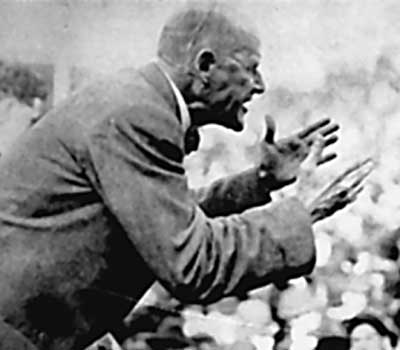The First Amendment is very basic in its protection of a citizen's right to speak freely and publicly. Throughout history, though, this protection has come into conflict with another primary (and in some ways more original) goal of the Constitution--to provide for national security. Consider the case of Eugene Debs, a three-time presidential candidate who found himself in
jail after refusing to recognize a ban on antiwar speeches. The right to free speech is called into question quite often, especially when the nation is at war.

on June 16, 1918. He would later be jailed for the speech.
Several laws laid the groundwork for Debs' arrest and imprisonment. Under pressure from President Woodrow Wilson, Congress had passed the Espionage Act of 1917 in a effort to curtail open criticism of the nation's involvement in World War I. The law made it a felony to "incite" opposition to the government during times of war. Less than two years later, Congress passed the Sedition Act of 1918, an amendment to the Espionage Act that clarified Section 3, the part of the law that was ultimately used to convict Debs of a crime. Read Section 3 below.
SEC. 3. Whoever, when the United States is at war, shall willfully make or convey false reports or false statements with intent to interfere with the operation or success of the military or naval forces of the United States, or to promote the success of its enemies, or shall willfully make or convey false reports, or false statements, or say or do anything except by way of bona fide and not disloyal advice to an investor... with intent to obstruct the sale by the United States of bonds... or the making of loans by or to the United States, or whoever, when the United States is at war, shall willfully cause... or incite... insubordination, disloyalty, mutiny, or refusal of duty, in the military or naval forces of the United States, or shall willfully obstruct... the recruiting or enlistment service of the United States, and whoever, when the United States is at war, shall willfully utter, print, write, or publish any disloyal, profane, scurrilous, or abusive language about the form of government of the United States, or the Constitution of the United States, or the military or naval forces of the United States, or the flag... or the uniform of the Army or Navy of the United States, or any language intended to bring the form of government... or the Constitution... or the military or naval forces... or the flag... of the United States into contempt, scorn, contumely, or disrepute... or shall willfully display the flag of any foreign enemy, or shall wilfully... urge, incite, or advocate any curtailment of production in this country of any thing or things... necessary or essential to the prosecution of the war... and whoever shall willfully advocate, teach, defend, or suggest the doing of any of the acts or things in this section enumerated and whoever shall by word or act support or favor the cause of any country with which the United States is at war or by word or act oppose the cause of the United States therein, shall be punished by a fine of not more than $10,000 or imprisonment for not more than twenty years, or both...."
Which phrases in the law apply to public protests against the war effort?
...whoever, when the United States is at war, shall willfully utter, print, write, or publish any disloyal, profane, scurrilous, or abusive language about the form of government of the United States, whoever shall willfully advocate, teach, defend, or suggest the doing of any of the acts or things in this section enumerated.
Eugene Debs' conviction was not the end of his presidential campaign; he managed to win a lot of votes from his jail cell because so many Americans opposed the entry of the United States into World War I. It also was not the last time that an American citizen was jailed simply for stating opposition to wartime reductions of civil liberties, a power that is theoretically allowed by the Constitution.
In the modern era, alternative viewpoints regarding the purpose and value of the Constitution are alive and well. Meanwhile, many American citizens believe that the Constitution has been fundamental to our national success, and many of those believe that its wisdom is just as relevant today as in 1787 when the Founding Fathers drafted it. What did the framers of the Constitution intend? Were national security issues more important than freedom of speech? And, perhaps more importantly, what do Americans think now? Later in this lesson, you'll have a chance to speak your mind about this issue.
First, though, take a minute to review some key ideas about the current status of free speech in America.
Where is the right to free speech guaranteed?
The freedoms of speech and religion are guaranteed in the First Amendment.
The freedoms of speech and religion are guaranteed in the First Amendment.
The freedoms of speech and religion are guaranteed in the First Amendment.
When do the limits set by the Espionage and Sedition Acts apply?
Congress justified the passage of the law as a national security measure.
Congress justified the passage of the law as a national security measure.
Congress justified the passage of the law as a national security measure.
You got # out of # correct. Click the Retry button for another attempt.
You got a perfect score. Great job!
